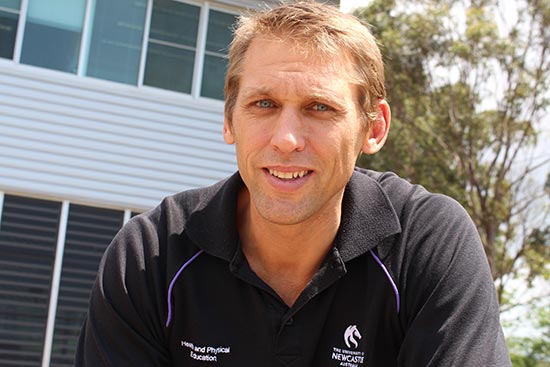
With the NSW Christmas school holidays in full swing, HMRI researcher Associate Professor David Lubans is urging children to spend more time in the backyard and less in front of the television and computer.

With the NSW Christmas school holidays in full swing, HMRI researcher Associate Professor David Lubans is urging children to spend more time in the backyard and less in front of the television and computer.
He is particularly concerned that recent studies have shown children’s fitness levels to be considerably lower than those of previous generations.
“Thirty years ago, children were completing a mile (1.6 kilometre) run around 90 seconds faster than children are today, which represents a 15 per cent reduction in cardio-respiratory fitness,” Associate Professor Lubans, from the University of Newcastle’s Priority Research Centre for Physical Activity and Nutrition, said.
“This is worrying because it’s unlikely they’re going to improve as they head into adolescence.
“The important thing for parents is limiting the amount of screen time their kids have – very young children should have none, infants, toddlers and pre-schools should have less than one hour, and those over 5 can have two hours.
“When kids sit in front of a screen they’re more likely to eat and less likely to realise they are full. It displaces time when they could be physically active and they’re also getting less social interaction.”
Associate Professor Lubans is currently finalising data from the school-based SCORES (Supporting Children’s Outcomes using Rewards, Exercise and Skills) study, which is showing significant improvements in physical activity, movement skill levels and cardio-respiratory fitness.
Funded by Newcastle’s Gastronomic Lunch and the Newcastle Jets, the program involved more than 400 children from years 3 and 4 in public schools around the Hunter Region.
“After six months we found the kids in the SCORES schools were doing an extra 10 minutes of moderate-to-vigorous physical activity each day,” Associate Professor Lubans said.
“After 12 months we have seen a large increase in their skill level when it comes to kicking, throwing and catching a ball. We also saw an improvement in the children’s fitness levels, with those in the intervention schools completing on average an extra four laps on the beep test.”
Associate Professor Lubans’ tips for the summer break include keeping a ball in the car to make physical activity fun, playing on the beach to avoid the heat, and buying gifts like frisbees that are inexpensive and promote activity.
HMRI is a partnership between the University of Newcastle, Hunter New England Health and the community.
HMRI would like to acknowledge the Traditional Custodians of the land on which we work and live, the Awabakal and Worimi peoples, and pay our respects to Elders past and present. We recognise and respect their cultural heritage and beliefs and their continued connection to their land.

Hunter Medical Research Institute
We’re taking healthy further.
Locked Bag 1000
New Lambton
NSW, Australia, 2305



This site is protected by reCAPTCHA and the Google Privacy Policy and Terms of Service apply.
Copyright © 2024 Hunter Medical Research Institute | ABN: 27 081 436 919
Site by Marlin Communications
